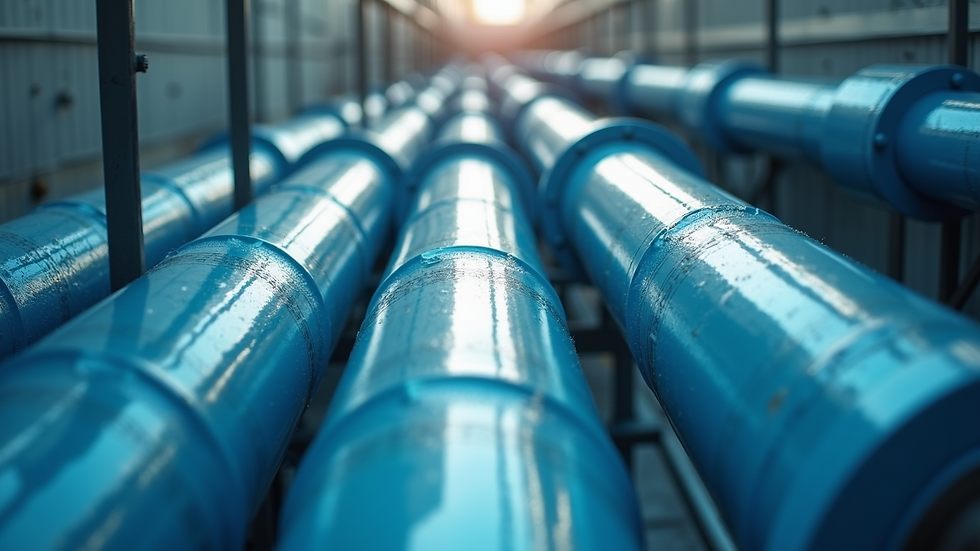How Industrial Wastewater Is Managed Effectively
- palwinder kaur
- Oct 6, 2025
- 3 min read
Industrial processes generate large volumes of wastewater that contain various pollutants. Managing this wastewater effectively is crucial to protect the environment, comply with regulations, and promote sustainable industrial growth. This article explores the key methods and technologies used in industrial water treatment to handle wastewater efficiently.
Understanding Industrial Water Treatment Processes
Industrial water treatment involves a series of physical, chemical, and biological processes designed to remove contaminants from wastewater before it is discharged or reused. The treatment approach depends on the type of industry, the nature of pollutants, and regulatory requirements.
Some common treatment stages include:
Preliminary Treatment: Removal of large solids and debris through screening and sedimentation.
Primary Treatment: Settling of suspended solids and removal of oils and greases.
Secondary Treatment: Biological processes that degrade organic matter using microorganisms.
Tertiary Treatment: Advanced filtration, chemical treatment, and disinfection to remove remaining contaminants.
Each stage plays a vital role in reducing the pollutant load and ensuring the treated water meets quality standards.

What is the meaning of industrial wastewater?
Industrial wastewater refers to the liquid waste generated from industrial activities such as manufacturing, mining, chemical production, and food processing. This wastewater often contains hazardous substances including heavy metals, organic compounds, oils, and suspended solids. Proper management of this wastewater is essential to prevent environmental pollution and health risks.
The composition of industrial wastewater varies widely depending on the industry. For example:
Textile industries may release dyes and chemicals.
Metal processing plants often discharge heavy metals.
Food processing units generate high organic loads.
Understanding the specific characteristics of wastewater helps in designing effective treatment systems tailored to the industry’s needs.

Key Technologies in Industrial Wastewater Management
Several advanced technologies are employed to treat industrial wastewater effectively. These include:
Membrane Filtration: Techniques like ultrafiltration and reverse osmosis remove fine particles and dissolved contaminants.
Chemical Precipitation: Used to remove heavy metals by converting them into insoluble forms.
Activated Sludge Process: A biological treatment where microorganisms consume organic pollutants.
Electrocoagulation: Uses electrical current to destabilize and remove suspended solids and heavy metals.
Constructed Wetlands: Natural treatment systems that use plants and soil microbes to purify wastewater.
Selecting the right technology depends on factors such as wastewater composition, treatment goals, and cost considerations.

Best Practices for Effective Industrial Wastewater Management
To ensure efficient treatment and compliance, industries should adopt the following best practices:
Source Reduction: Minimize wastewater generation by optimizing processes and using cleaner production techniques.
Regular Monitoring: Conduct frequent testing of wastewater quality to detect issues early.
Proper Segregation: Separate hazardous and non-hazardous wastewater streams for targeted treatment.
Employee Training: Educate staff on wastewater handling and emergency response.
Reuse and Recycling: Implement systems to recycle treated water within the facility, reducing freshwater consumption.
By integrating these practices, industries can reduce environmental impact and operational costs.
The Role of Regulations and Compliance in Industrial Wastewater Treatment
Governments worldwide enforce strict regulations to control industrial wastewater discharge. Compliance with these regulations is mandatory to avoid penalties and protect public health.
Key regulatory aspects include:
Effluent Standards: Limits on pollutant concentrations in discharged water.
Permitting: Requirement to obtain discharge permits specifying treatment and monitoring conditions.
Reporting: Regular submission of wastewater quality data to authorities.
Environmental Audits: Periodic inspections to ensure adherence to standards.
Industries must stay updated on local regulations and invest in appropriate treatment technologies to maintain compliance.
Future Trends in Industrial Wastewater Management
The future of industrial wastewater management is shaped by innovation and sustainability goals. Emerging trends include:
Digital Monitoring: Use of IoT sensors and AI for real-time wastewater quality tracking.
Resource Recovery: Extracting valuable materials like metals and nutrients from wastewater.
Green Technologies: Adoption of eco-friendly treatment methods such as bioelectrochemical systems.
Zero Liquid Discharge (ZLD): Systems designed to eliminate wastewater discharge by maximizing reuse.
These advancements promise to make industrial water treatment more efficient, cost-effective, and environmentally responsible.
Effective management of industrial wastewater is essential for sustainable industrial operations. By understanding treatment processes, adopting advanced technologies, and complying with regulations, industries can significantly reduce their environmental footprint while optimizing resource use. Continuous innovation and best practices will further enhance the efficiency of industrial water treatment in the years to come.



Comments